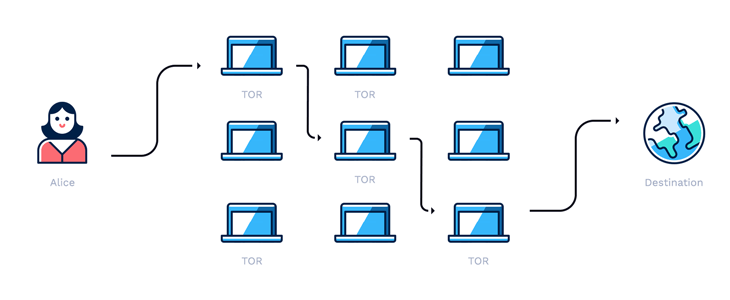Featured
Table of Contents
Tor Vs Vpn: Which Is Better?
In practice, Tor Browser is complimentary, while VPNs are usually paid, which makes your choice easy? Today, I want to give you a complete contrast of Tor vs VPN and explain what they represent, their distinctions, utilize cases, and much more.
To start this Tor vs VPN contrast, I first need to discuss what these tools represent. Giving you a clear definition of what they are and how they work will assist you understand their distinctions, so pay close attention. Beginning with Tor, this term is an abbreviation for "The Onion Router".
Nord, VPN It's vital to keep in mind that this is a tool for anonymity and not personal privacy I'll explain why shortly. When it pertains to Tor nodes, they're held and preserved by volunteers, so we're discussing a decentralized service, instead of a centralized service which is the case with a VPN.
The great side is privacy because nodes aren't operated by any specific business, so you aren't risking storing and logging your surfing activity by that company. On the other hand, the security of each node depends on the person that's preserving it. A node can be compromised by a hacker, let's state, who will be able to trace your connection.
Tor Vs. Vpn: Which Should You Use? - Thebestvpn.com
The entry node is more critical since, when linking to Tor, your ISP can see that you did that through the entry node. That's why lots of individuals use a VPN with Tor to secure their connection and prevent the ISP from seeing their Tor usage. We'll talk about that later on in this Tor vs VPN post.

Its "The Onion Router" name originates from the truth that it peels the layers of file encryption similarly to the onion layers. And dark web sites likewise have the domain ". onion", which isn't a coincidence. Listed below, I described how Tor works and the procedure of encrypting and decrypting your demands.
When you connect to the Tor network and you send out a request, you get triple file encryption for each node. There's the entry node (typically called the guard node), the middle node (or middle server), and the exit node. Tor sends your demand to the entry node, which eliminates the very first layer of file encryption.
However, the entry node can't read the encrypted material of the request, so it still can't trace your activities inside the Tor network. The traffic is then sent out to the middle node, which removes another layer of encryption and sends out the encrypted traffic to the exit node. The exit node peels the last layer of file encryption, which is why it can see the encrypted request but it can't recognize who is sending it since it can't see your IP address.
Can I Use A Vpn With Tor?
If you're looking to remain anonymous online and you're thinking about utilizing Tor, I believe it's great to know more about its advantages and downsides, so examine them out below. The triple layer of encryption guarantees 100% privacy when utilizing Tor Internet browser It's complimentary and does not require any memberships It's a decentralized, open-source network with no tracking and security Tor Browser is capable of going on the dark web The entry node can read your IP address and make it noticeable to your ISP when using Tor Slows down your internet speed substantially due to sophisticated encryption Nodes are run by volunteers who might not do a fantastic task at making sure they're safe You can't pick an IP address from a specific nation, so you can't bypass geo-blocks Tor Internet browser does not work on all platforms Wondering what are the distinctions between Tor and VPN?
VPN services offer thousands of servers in different nations, so they permit you to link to any of them easily and get an IP from the country you need. Then, each request you send out is routed through a VPN tunnel where it is sent out to a VPN server which decrypts it and links you to the site you desire.
g. the site you're checking out The same process applies to traffic coming from the network from your device. It's crucial to explain that a while Tor (Tor Internet browser) is concentrated on the part of the connection in Tor Internet browser. This is why a VPN is appropriate for torrenting, for instance, while Tor secures only the part of the connection sent out through the Tor Web browser.

With a single layer of encryption, the VPN really goes through less steps to protect your connection which has a big advantage much faster speeds and much better efficiency. Lastly, let's discuss the pros and cons of VPNs and see what they do well and what are their drawbacks. They're extremely simple to use VPNs can be set up on every platform (Windows, i, OS, Linux, Android, mac, OS, routers,) You can choose an IP address from a specific country, letting you bypass geo-restrictions There's a higher degree of accountability because you understand who owns the VPN servers VPNs are very quick and exceptional companies provide 10 Gbps servers Advanced security functions like a kill switch, advertisement blocker, and Multi, Hop Overall privacy, thanks to advanced encryption and the capability to hide your initial IP It's a paid service which can be a problem for budget-constricted users Some VPN services are understood for storing logs (Hola VPN, Ninja, VPN, Betternet,) You should pick a reliable VPN that has a no-logs policy because you're handing over your privacy/anonymity to that company Now that you what Tor and VPN are, I feel the need to rapidly summarize their distinctions simply to ensure you comprehend whatever well.
Latest Posts
Business Vpn: What Is It And Which One Should You Consider?
What Is A Business Vpn? Understand Its Uses And ...
Business Vpn For Small & Enterprise Companies